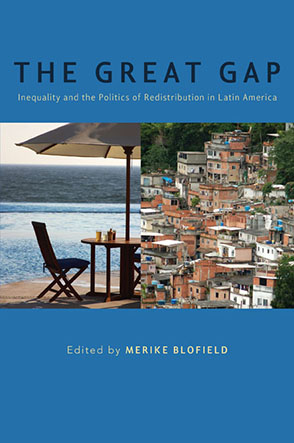The Great Gap: Inequality and the Politics of Redistribution in Latin America

Book Summary
The relationship between socioeconomic inequality and democratic politics has been one of the central questions in the social sciences from Aristotle on. Recent waves of democratization, combined with deepened global inequalities, have made understanding this relationship ever more crucial. In The Great Gap, Merike Blofield seeks to contribute to this understanding by analyzing inequality and politics in the region with the highest socioeconomic inequalities in the world: Latin America. The chapters, written by prominent scholars in their fields, address the socioeconomic context and inequality of opportunities; elite culture, public opinion, and media framing; capital mobility, campaign financing, representation, and gender equality policies; and taxation and social policies.
Aside from the editor, the contributors are Pablo Alegre, Maurício Bugarin, Daniela Campello, Anna Crespo, Francisco H. G. Ferreira, Fernando Filgueira, Liesl Haas, Sallie Hughes, Juan Pablo Luna, James E. Mahon Jr., Juliana Martínez Franzoni, Adriana Cuoco Portugal, Paola Prado, Elisa P. Reis, Luis Reygadas, Sergio Naruhiko Sakurai, and Koen Voorend.
Reviews
“I find The Great Gap to be the best and most important contribution to the study of Latin America written for quite some time.”
Guillermo O’Donnell, University of Notre Dame
“Inequality encompasses diverse aspects of social, political, and territorial relations that commonly elude even learned discussions and debates. The Great Gap sets a high standard for Latin Americanists as well as comparativists in terms of both the breadth and depth of its analyses of this fundamental issue.”
Richard Tardanico, Florida International University
“Social scientists have long assumed that political democracy will reduce social and economic inequalities. Thus, they have been puzzled by the persistence of extreme inequalities under democratic regimes in Latin America. Merike Blofield and her co-authors shed new light on this question by exploring how inequalities shape group interests, political power, and democratic processes, often in ways that reproduce those very inequalities. This provocative and insightful text breaks new ground in the study of the political economy of inequality, in Latin America and beyond.”
Kenneth M. Roberts, Cornell University
“Blofield’s volume is itself a wake-up call that democracy is only as strong as the level of equality it can help to produce.”
Darryl McLeod, Americas Quarterly
About the Editor
Merike Blofield is a Professor of Political Science at the University of Hamburg, with a focus on global health and social policy.
Her research addresses when and how do governments produce more equity-enhancing policies, with a focus on Latin America. She analyses policy areas that intersect social, health, family, gender and labour policy.

